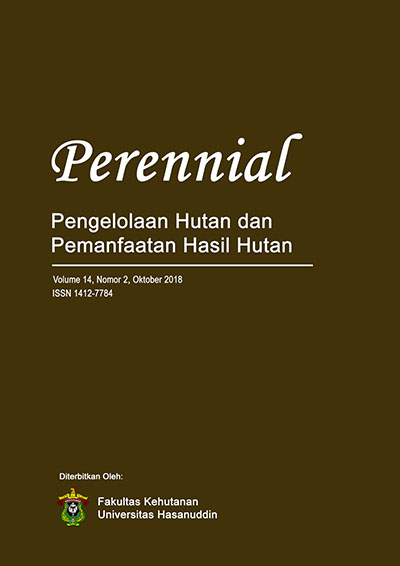Persepsi Masyarakat Pesisir dalam Pengelolaan Ekosistem Hutan Mangrove di Muara Gembong Bekasi Jawa Barat
DOI:
https://doi.org/10.24259/perennial.v14i2.5303Abstract
Increasing population growth in coastal areas, resulting in increasing demand for land for settlements, plantations, aquaculture, and other uses. This causes a lot of mangrove land being damaged. This research aims to know the people's perceptions of the function and role of mangrove forests and the management of sustainable mangrove forest ecosystems. The location of sample data collection is in Pantai Bahagia Village, Muara Gembong District, West Java. The sampling technique used to assess community perceptions is a selected technique (purposive sampling) with 30 respondents. Community perception of the function and role of mangrove forests in Muara Gembong is in the high category. The community has experienced the negative impacts of mangrove forest degradation, such as tidal floods, fishpond damage, and sea water intrusion, so that the community is aware of the importance of the function and role of mangrove forests for the survival of the community in the future. Community perception of mangrove forest ecosystem management in Muara Gembong is in the high category. All losses experienced by the community, whether in the form of fishpond damage, road access, to residential houses, foster public awareness of the importance of sustainable management of mangrove forest ecosystems.
Key words: Perception; Forest Management; Mangrove; Muara Gembon
References
Arikunto, S. (2006). Prosedur Penelitian. Suatu Pendekatan Praktik. Jakarta: Rineka Cipta.
Dolisca, F., McDaniel, J. M. and Teeter, L. D. (2007). Farmers’ perceptions towards forests: A case study from Haiti. Forest Policy & Economics, 9(6), 704–712.
Ekawati. (2012). Analisis Proses Pembuatan dan Implementasi Desentralisasi Pengelolaan Hutan Lindung (Studi Kasus di Tiga Kabupaten dalam DAS Batanghari). Institut Pertanian Bogor.
Fauzi, A. (2004). Ekonomi Sumber daya Alam dan Lingkungan Teori dan Aplikasi. Jakarta: PT Gramedia Pustaka Utama.
Gumilar, I. (2012). Partisipasi Masyarakat Pesisir dalam Pengelolaan Ekosistem Hutan Mangrove Berkelanjutan di Kabupaten Indramayu. Jurnal Akuatika, III(2), 198–211.
Kehutanan, K. L. H. dan. (2017). Miliki 23% Ekosistem Mangrove Dunia, Indonesia Tuan Rumah Konferensi Internasional Mangrove 2017. Retrieved February 6, 2018, from http://ppid.menlhk.go.id/siaran_pers/browse/561.
Lee, H. F. and Zhang, D. D. (2008). Perceiving the environment from the lay perspective in desertified areas, northern China. Environmental Management, 41(2), 168–182. https://doi.org/doi.org/10.1007/s00267-007-9052-8
Nybakken, & J.W. (1982). Biologi Laut : Suatu pendekatan Ekologis. Jakarta: Gramedia.
Reed et.al. (2004). Who’s in and why? A typology of stakeholder analysis methods for natural resource management. Journal of Environmental Management, Page: 1933-1949.
Salampessy, M. L., Febryano, I. G., Martin, E., Siahaya, M. E., & Papilaya, R. (2015). Cultural Capital of the Communities in the Mangrove Conservation in the Coastal areas of Ambon Dalam Bay, Moluccas, Indonesia. Procedia Environmental Sciences, 23(Ictcred 2014), 222–229. https://doi.org/10.1016/j.proenv.2015.01.034
Setiawan, H., Purwanti, R., & Garsetiasih, R. (2017). Persepsi dan Sikap Masyarakat terhadap Konservasi Ekosistem Mangrove di Pulau Tanakeke Sulawesi Selatan. Jurnal Penelitian Sosial Dan Ekonomi Kehutanan, 14(1), 57–70.
Singarimbun, M., & Effendi, S. (2008). Metode Penelitian Survei. Jakarta: LP3ES.
Slamet, Y. (1993). Analisis Kuantitatif Untuk Data Sosial. Solo: Dabara Publisher.
Sodikin. (2013). Kerusakan Mangrove serta Korelasinya terhadap Tingkat Intrusi Air Laut (Studi Kasus di Desa Pantai Bahagia Kecamatan Muara Gembong Kabupaten Bekasi). Universitas Diponegoro.
Sodikin. (2014). Analisis Abrasi dengan Menggunakan Teknologi Penginderaan Jauh (Studi Kasus di Desa Pantai Bahagia Kecamatan Muara Gembong Kabupaten Bekasi), 1–8.
Sugiyono. (2009). Metode Penelitian Kuantitatif, Kualitatif dan R&D. Bandung: Alfabeta.


